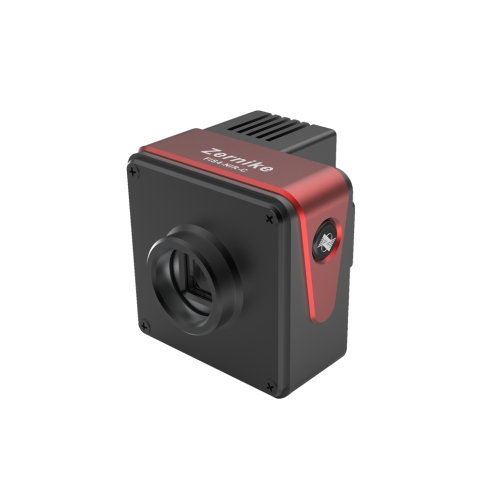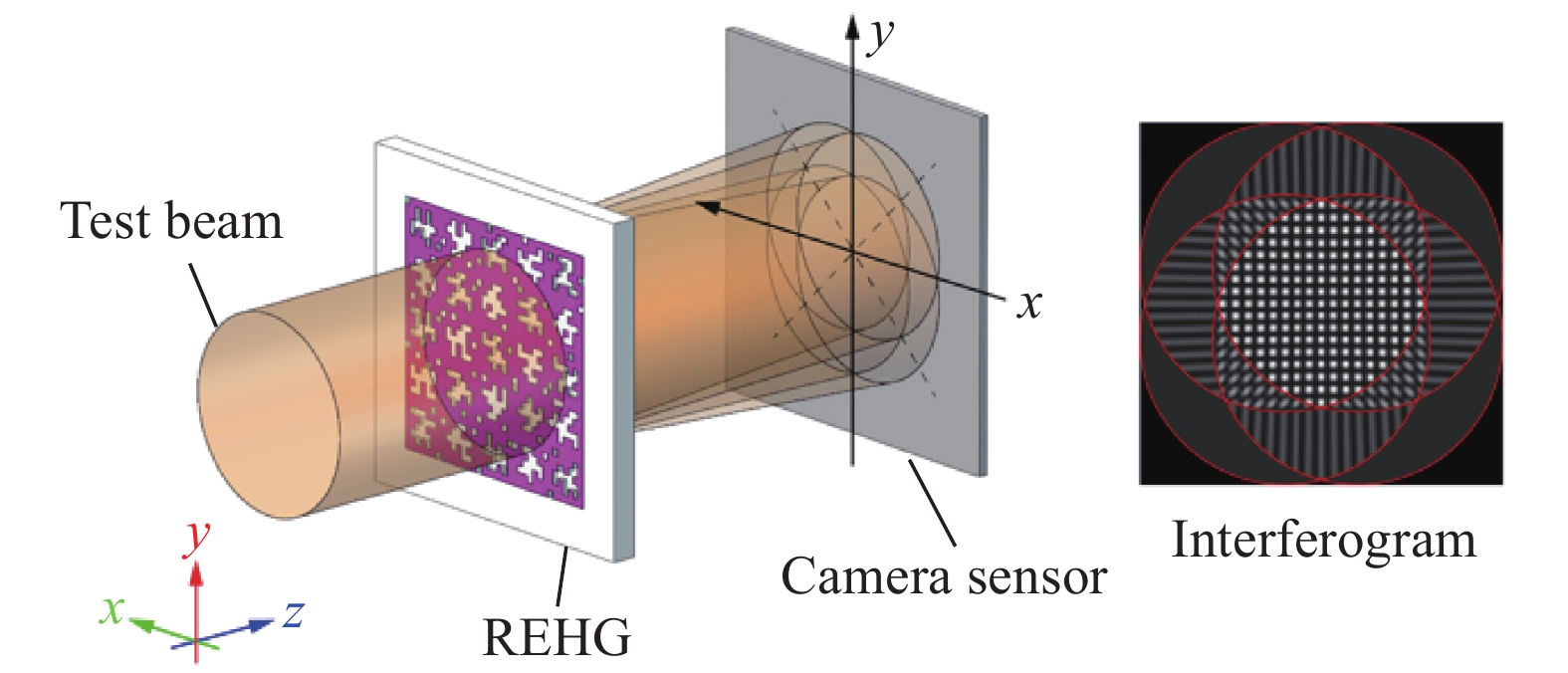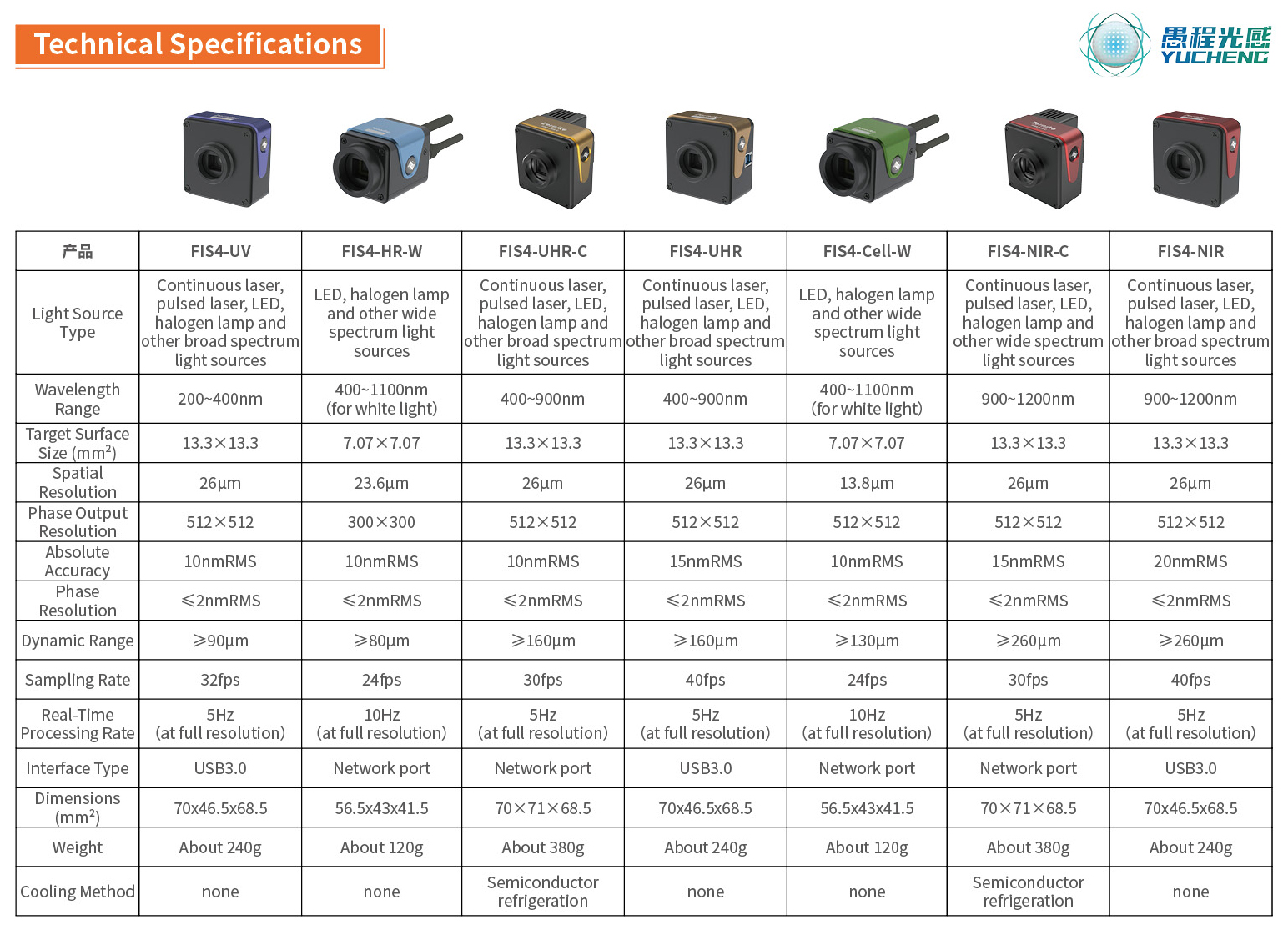FIS4 Near-Infrared wavefront sensor (Refrigerated version) 900-1200nm
The Bojiong FIS4 NIR-C wavefront sensor 900-1200nm is designed for demanding infrared optical applications. It integrates a high-precision semiconductor cooling system on the FIS4 near-infrared wavefront sensor. This actively stabilizes the core detector temperature below -10°C ambient, significantly suppressing dark current and thermal noise, and achieving an ultra-high measurement stability of 2nm RMS. Covering the 900–1200nm near-infrared band, the sensor boasts an ultra-high 512×512 spatial resolution and a wide dynamic range of ≥260μm, enabling clear analysis of the wavefront distortion and phase distribution of high-power lasers, metasurface devices, and silicon-based semiconductors in the infrared.
Bojiong FIS4 NIR-C wavefront sensor 900-1200nm Introduction
The Bojiong FIS4 Near-Infrared wavefront sensor (Refrigerated version)900-1200nm is our company's new generation of high-precision optical inspection equipment, featuring excellent vibration resistance and real-time wavefront measurement capabilities. The FIS4 NIR-C wavefront sensor adheres to the strict ISO 9001 quality management system and is certified by the China Institute of Metrology (NIM). It comes with a one-year warranty. The FIS4 NIR-C wavefront sensor utilizes a common-path interferometric optical design and a real-time wavefront reconstruction algorithm to achieve high-precision wavefront measurement without phase shifting, making it suitable for a variety of demanding scientific research and industrial applications.
Bojiong FIS4 NIR-C wavefront sensor 900-1200nm Parameter (Specification)
|
Light source |
Continuous laser, pulsed laser LED; Halogen lamp and other broad spectrum light sources |
|
Wavelength range |
900~1200nm |
|
Target size |
13.3mm×13.3mm |
|
Spatial resolution |
26μm |
|
Phase output resolution |
512×512 |
|
Absolute accuracy |
15nmRMS |
|
Phase resolution |
≤2nmRMS |
|
Dynamic range |
≥260μm |
|
Sample Rate |
30fps |
|
Real time processing speed |
5Hz(At full resolution) |
|
Interface type |
Network interface |
|
Size |
70mm×71mm×68.5mm |
|
Weight |
About380g |
|
Cooling method |
Semiconductor refrigeration |
Bojiong FIS4 NIR-C wavefront sensor 900-1200nm Feature And Application
Since 2006, Professor Yang Yongying's team at Zhejiang University has successfully developed the wide-spectrum FIS4 series wavefront sensor, based on a common-path interferometer structure and real-time wavefront reconstruction algorithms. After 17 years of continuous research, this product offers the following key advantages:
· Excellent vibration resistance, no vibration isolation platform required;
· Nanometer-level sensitivity, with wavefront measurement sensitivity reaching up to 2 nm RMS;
· Integrated single-optical path design, innovatively using a single-optical path structure, no reference optical path needed;
· User-friendly operation;
· Compact and portable, easy to carry around, suitable for various on-site integrations and applications
The FIS4 Near-Infrared wavefront sensor (Refrigerated version) 900-1200nm is designed for high-precision optical inspection and measurement, suitable for industrial inspection, scientific research, and defense applications. With a high resolution of 512×512 (262,144) phase points, the sensor achieves high-precision wavefront measurement across a wide spectral range of 900–1200 nm and supports real-time 3D display at 10 frames per second at full resolution. Typical applications include optical system aberration analysis, optical calibration, material internal lattice distribution detection, metasurface and metalens wavefront characterization, etc., providing reliable tools for high-end optical measurement.
Bojiong FIS4 NIR-C wavefront sensor 900-1200nm Application
|
Example of aberration measurement in optical systems
|
Example of measuring the internal lattice distribution of materials
|
|
Example of Optical System Calibration Measurement |
|
|
Example of Super Lens Wavefront Measurement |
|
Bojiong FIS4 NIR-C wavefront sensor 900-1200nm Details

The FIS4 Near-Infrared wavefront sensor (Refrigerated version) 900-1200nm utilizes patented random coded four-wave diffraction technology, leveraging a single-path light source to achieve self-interference of the measured wavefront, with interference occurring at the rear image plane. This technology significantly reduces reliance on light source coherence, eliminating the need for a phase shifter and enabling high-precision interferometry when combined with a standard imaging system. Compared to traditional Hartmann sensors based on microlens arrays, the FIS4 NIR-C wavefront sensor outperforms traditional dual-beam interferometers, offering significant performance advantages in multiple areas: higher-resolution phase points, wider operating band adaptability, and greater dynamic range, all while offering superior cost-performance, providing a reliable solution for a wide range of precision optical inspection applications.

Fig.1.Phase imaging principle based on four-wave lateral shearing interference using randomly coded hybrid grating (REHG)

Fig.2.Least square wavefront reconstruction from four-wave lateral shearing interferogram

The FIS4 wavefront sensor is an excellent tool in the fields of scientific research and industrial inspection. It cleverly combines many advantages such as compactness, high stability, excellent temporal resolution, and good system compatibility, making it a core tool in related fields.
In terms of applications, its development history bears witness to its strong adaptability and scalability. Initially, the FIS4 wavefront sensor was primarily utilized for basic inspection tasks in optical workshops. For instance, in the quality analysis of optical components, it can accurately assess whether the component quality meets standards, leveraging its high-precision detection capabilities. In laser beam diagnosis, it can meticulously analyze various parameters of the laser beam, providing a reliable basis for subsequent optimization and adjustment. Furthermore, in the field of adaptive optics control, it also plays a pivotal role, facilitating precise optical control.
Nowadays, the application scope of the FIS4 wavefront sensor has been extensively extended. In the field of biological microscopy imaging, it enables researchers to observe biological microstructures more clearly. In nanoparticle tracking, it can precisely track the movement trajectory and other key information of nanoparticles. In metasurface measurement work, it provides accurate measurement data, facilitating in-depth research. In various fields such as thermodynamic characterization, it also demonstrates indispensable value.
From the perspective of structural characteristics, the FIS4 wavefront sensor boasts a compact and exquisite design, enabling it to be easily integrated into existing microscope systems and significantly expanding its application scenarios. Additionally, it possesses excellent anti-vibration capabilities, ensuring measurement accuracy even in harsh external environments. This guarantees that detection results are not affected by external interference, providing stability and reliability.
It is worth mentioning that the single-exposure imaging function of the FIS4 wavefront sensor is highly advantageous, especially for recording fast dynamic processes. In the field of biomedical research, with this function, it has successfully achieved label-free, high-resolution real-time observation of various living cells such as COS-7, HT1080, RPE, CHO, HEK, and neurons, providing a powerful observation tool for biomedical research.
In addition, this sensor supports high-contrast phase delay imaging, which enables the clear visualization of anisotropic structures such as collagen fibers and cytoskeletons, providing a clear image basis for in-depth research on related biological structures. Furthermore, its application range has been further expanded to phase imaging in the X-ray, mid-infrared, and long-infrared wavelength bands, demonstrating significant value in the analysis of metasurfaces and two-dimensional materials, and effectively driving research progress in these frontier fields.
Address
No. 578 Yingkou Road, Yangpu District, Shanghai, China
Tel

